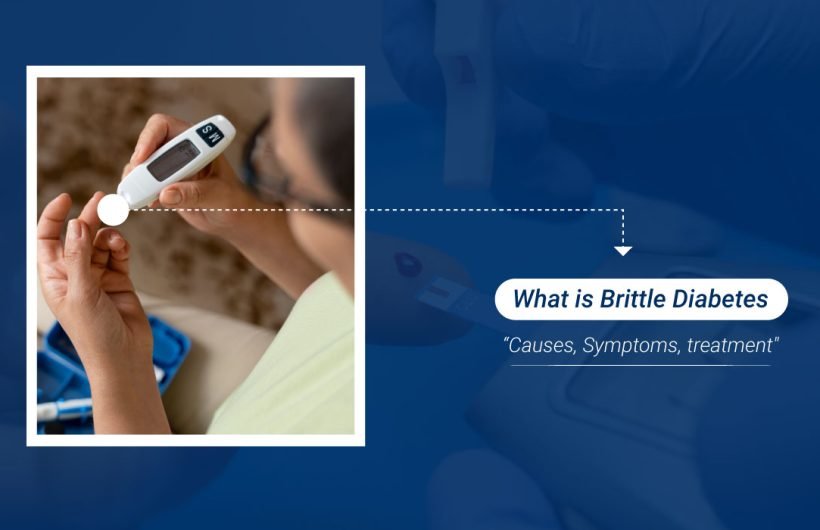Diabetes, a chronic condition affecting millions globally, comes in various forms, with each posing its unique set of challenges. One such complex variant is brittle diabetes, a condition that significantly complicates the management of blood sugar levels. In this comprehensive guide, we will delve into the intricacies of brittle diabetes, exploring its causes, symptoms, and cutting-edge treatments that offer hope to those grappling with this challenging condition.
What is Brittle Diabetes?
Brittle diabetes, also known as labile or unstable diabetes, is a subtype of diabetes characterized by extreme and unpredictable fluctuations in blood sugar levels. Unlike stable diabetes management, where patients can maintain relatively consistent blood glucose levels through medication, diet, and lifestyle changes, individuals with brittle diabetes experience erratic highs and lows that can be difficult to control.

What’s the difference between Diabetes and Brittle Diabetes?
Diabetes is a chronic condition characterized by elevated blood sugar levels. Brittle diabetes, a rare subtype, differs in its unpredictability, causing extreme fluctuations in blood glucose levels that are challenging to control. Unlike stable diabetes management, individuals with brittle diabetes experience erratic highs and lows, often leading to severe symptoms.
The precise causes of brittle diabetes are not fully understood, but it is more prevalent in individuals with Type 1 diabetes rather than Type 2 Diabetes, particularly affecting women in their 20s and 30s. Managing brittle diabetes requires specialized approaches, such as continuous glucose monitoring and personalized insulin plans, to address its unique challenges.
How prevalent is brittle diabetes?
Brittle diabetes is a rare condition, impacting approximately 3 out of every 1,000 individuals with insulin-dependent diabetes.
Who is susceptible to brittle diabetes?
Brittle diabetes is more frequently observed in individuals diagnosed with Type 1 diabetes, where the body does not produce insulin. Although the precise reasons are not completely clear, this condition tends to be most prevalent among women in their 20s and 30s.
Causes of Brittle Diabetes
Understanding the brittle diabetes causes is crucial for devising effective management strategies. While the exact reasons remain elusive, several factors contribute to the development of this condition:
- Insulin Sensitivity: Individuals with brittle diabetes causes often exhibit heightened sensitivity to insulin, making it challenging to predict how their bodies will respond to standard insulin doses.
- Hormonal Changes: Fluctuations in hormones, particularly during puberty, menstruation, and menopause, can trigger extreme variations in blood sugar levels.
- Stress and Emotional Factors: Emotional stress, anxiety, and other psychological factors can have a profound impact on blood glucose levels, leading to instability in individuals with brittle diabetes.
Symptoms of Brittle Diabetes
Identifying the brittle diabetes symptoms is crucial for prompt intervention and management. Common indicators include:
- Frequent Hypoglycemia and Hyperglycemia: Sudden and severe drops or spikes in blood sugar levels are characteristic of brittle diabetes, leading to symptoms such as dizziness, confusion, and fatigue.
- Unexplained Weight Changes: Individuals with brittle diabetes symptoms may experience unexplained weight loss or gain despite efforts to maintain a consistent diet.
- Increased Thirst and Urination: Extreme blood sugar fluctuations can cause increased thirst and frequent urination, classic symptoms of diabetes.
- Blurry Vision: Fluctuations in blood sugar levels can impact vision, leading to temporary blurriness.
Treatment Approaches for Brittle Diabetes
Effectively managing brittle diabetes treatment requires a tailored approach that addresses the unique challenges posed by this condition. Treatment options include:
- Continuous Glucose Monitoring (CGM): CGM systems provide real-time data on blood sugar levels, enabling individuals with brittle diabetes and their healthcare providers to make timely adjustments to insulin doses.
- Insulin Pump Therapy: Insulin pumps deliver a continuous supply of insulin, minimizing the risk of sudden spikes or drops in blood sugar levels.
- Individualised Insulin Plans: Tailoring insulin regimens to an individual’s specific needs is crucial for managing brittle diabetes treatment effectively.
- Psychological Support: Given the significant impact of stress and emotions on blood sugar levels, psychological support, including counseling and stress management techniques, is an integral part of brittle diabetes treatment management.
Conclusion
Brittle diabetes presents a unique set of challenges, but with advances in technology and personalized care, individuals can gain better control over their blood sugar levels. By understanding the causes, recognizing symptoms, and embracing innovative treatments, those with brittle diabetes can embark on a path toward improved health and well-being.
For individuals grappling with brittle diabetes, seeking the expertise of a diabetes specialist is paramount. Renowned diabetes specialists In Ahmedabad provide comprehensive care, combining the latest advancements in diabetes management with personalized treatment plans. For those seeking dedicated adherence to treatment plans and monitoring, consider reaching out to Dr. Moxit Shah. As a distinguished Endocrinologist, he specializes in the diagnosis and treatment of health conditions related to body hormones and various types of diabetes. Dr. Shah’s expertise extends to the effective management of steroid-induced diabetes, providing comprehensive care and support.






